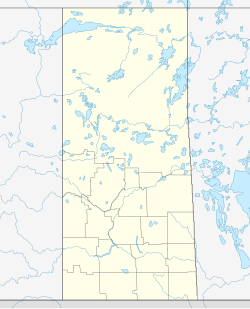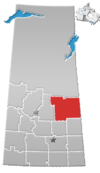Valparaiso, Saskatchewan
Valparaiso | |
|---|---|
| Village of Valparaiso | |
| Coordinates: 52°30′21″N 104°06′18″W / 52.505964°N 104.104995°W | |
| Country | |
| Province | |
| Region | Central |
| Census division | 13 |
| Rural Municipality | Star City No. 428 |
| Government | |
| • Type | Municipal |
| • Governing body | Valparaiso Village Council |
| • Mayor | Margaret Emro |
| • Administrator | Ann Campbell |
| Area | |
| • Total | 0.69 km2 (0.27 sq mi) |
| Population (2016) | |
| • Total | 15 |
| • Density | 21.6/km2 (56/sq mi) |
| Time zone | UTC-6 (CST) |
| Postal code | S0E 1P0 |
| Area code | 306 |
| Highways | |
| Railways | Canadian National Railway |
| [1][2][3][4] | |
Valparaiso (2016 population: 15) is a village in the Canadian province of Saskatchewan within the Rural Municipality of Star City No. 428 and Census Division No. 14. The village is located at the junction of Highway 3 and Range Road No. 160, approximately 20 km east of the City of Melfort. The name comes from that of Valparaíso in Chile.[5]
History
[edit]Valparaiso incorporated as a village on July 18, 1924.[6]
Demographics
[edit]In the 2021 Census of Population conducted by Statistics Canada, Valparaiso had a population of 25 living in 11 of its 11 total private dwellings, a change of 66.7% from its 2016 population of 15. With a land area of 0.74 km2 (0.29 sq mi), it had a population density of 33.8/km2 (87.5/sq mi) in 2021.[9]
In the 2016 Census of Population, the Village of Valparaiso recorded a population of 15 living in 9 of its 11 total private dwellings, a 0% change from its 2011 population of 15. With a land area of 0.69 km2 (0.27 sq mi), it had a population density of 21.7/km2 (56.3/sq mi) in 2016.[10]
See also
[edit]References
[edit]- ^ National Archives, Archivia Net. "Post Offices and Postmasters".
- ^ Government of Saskatchewan, MRD Home. "Municipal Directory System". Archived from the original on November 21, 2008.
- ^ Canadian Textiles Institute. (2005). "CTI Determine your provincial constituency". Archived from the original on 2007-09-11.
- ^ Commissioner of Canada Elections, Chief Electoral Officer of Canada (2005). "Elections Canada On-line".
- ^ Rayburn, Alan (2001). Naming Canada: Stories about Canadian Place Names. University of Toronto Press. p. 117. ISBN 9780802047250.
- ^ "Urban Municipality Incorporations". Saskatchewan Ministry of Government Relations. Archived from the original on October 15, 2014. Retrieved June 1, 2020.
- ^ "Saskatchewan Census Population" (PDF). Saskatchewan Bureau of Statistics. Archived from the original (PDF) on September 24, 2015. Retrieved May 31, 2020.
- ^ "Saskatchewan Census Population". Saskatchewan Bureau of Statistics. Retrieved May 31, 2020.
- ^ "Population and dwelling counts: Canada, provinces and territories, census divisions and census subdivisions (municipalities), Saskatchewan". Statistics Canada. February 9, 2022. Retrieved April 1, 2022.
- ^ "Population and dwelling counts, for Canada, provinces and territories, and census subdivisions (municipalities), 2016 and 2011 censuses – 100% data (Saskatchewan)". Statistics Canada. February 8, 2017. Retrieved May 30, 2020.



